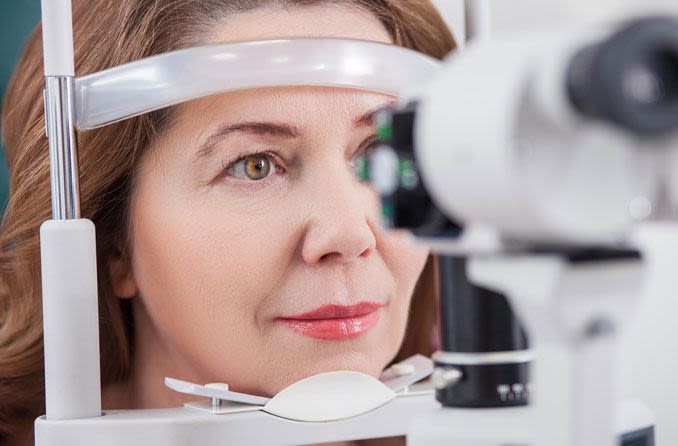5 reasons eye exams are important

The importance of annual eye exams goes well beyond just making sure your vision isn't blurry.
Here are five reasons why eye exams are important — and why you should have annual eye exams to safeguard your health and wellness.
1. Eye exams help children succeed in school.
Did you know that 80 percent of what children are expected to learn in and outside the classroom requires good vision? It's true — and that statistic, which has been around for a long time, probably should be revised upward because of the ever-increasing amount of screen time kids are exposed to these days.
An annual eye exam is the only way to ensure your child is seeing clearly and comfortably to succeed in the classroom. It’s also the only way to know for sure if kids are seeing their best for sports and other activities, too.
2. Myopia is becoming an epidemic.
The number of children who are developing shortsightedness (myopia) is growing faster than ever. And more kids are getting short-sighted at a very early age.
Why is this a big concern?
Children who become short-sighted very early in life tend to experience a worsening and progression of shortsightedness that continues throughout childhood — and this puts them at a significantly greater risk of very serious and potentially sight-threatening eye conditions later in life, including cataracts, glaucoma and retinal detachment.
Scheduling annual eye exams is the best way to assess your child's risk of myopia. When detected early, myopia control measures can be taken to slow the progression of myopia and reduce your child’s risk of serious eye problems later in life.
HAVEN'T HAD YOUR EYES EXAMINED RECENTLY? Find an optician near you and schedule an eye exam.
3. Vision screenings are no substitute for an eye exam.
Too often, parents are led to believe their child is seeing perfectly well because they passed a school vision screening. Or adults think they see perfectly because they pass a number-plate test in their driving lesson.
Frequently, neither of these assumptions are correct.
Vision screenings are just that — they screen out individuals who have serious (and usually quite obvious) vision problems.
Screenings can identify apparent problems a person might have with specific visual tasks, such as seeing a blackboard clearly in the classroom or recognising road signs and other objects from behind the wheel.
Only a comprehensive eye exam by an optician (optometrist or ophthalmologist) can insure your vision is as clear and comfortable as possible — and that you're free from potentially serious eye diseases that don’t have obvious early symptoms, including glaucoma and even eye cancer.
4. Glaucoma.
Of all serious eye diseases, glaucoma is probably the sneakiest. That's because there are no discernible symptoms in most cases of early glaucoma — nothing to alert you that something's going wrong.
People who fail to have routine eye exams and develop glaucoma typically become aware of it only after they’ve sustained permanent vision loss from the disease. And by that time, controlling glaucoma to prevent additional vision loss can be very difficult.
Without successful control with medical treatment and/or glaucoma surgery, the disease can lead to blindness.
Early detection of high eye pressure and other risk factors for glaucoma is possible only with routine eye exams. Vision screenings do little to nothing to identify or prevent glaucoma.
5. Annual eye exams can detect other serious health problems.
Did you know that many people first learn they have serious health conditions such as diabetes, high blood pressure, high cholesterol and even cancer from — yes, you guessed it — a routine eye exam.
Our eyes have been called "the window to our soul." It turns out, they also are often a very effective window to our overall health.
During a comprehensive eye exam, your optician can observe and evaluate the health and condition of the blood vessels in your retina, which are a good predictor of the health of blood vessels throughout your body. Conditions such as diabetes, hypertension and hypercholesterolemia all are visible by changes in the appearance of the retinal blood supply and blood vessels.
Annual eye exams are especially important for anyone with diabetes or who might be at risk for the disease (due to obesity, family history or other reasons).
More than 4 million people in the UK with diabetes and another 7 million who have prediabetes are at risk for developing diabetic eye disease, the leading cause of blindness among adults. In its early stages, diabetic eye disease has no visible symptoms; only a comprehensive eye exam can detect signs of the disease so treatment can begin soon enough to prevent vision loss.
Also, research is advancing to develop an eye test to identify your risk of Alzheimer's disease that may soon be performed during a comprehensive eye exam.
Don't put it off — schedule an eye exam today
Even if you think you have perfect vision, an annual eye exam can be one of the best things you can do to protect your health and wellness.
Don't dally — find an optician near you and get your eyes checked.
SEE RELATED: Why you should get your eyes tested regularly
Page published on Tuesday, 25 June 2019






